Fleurs du Mal Magazine


Or see the index
This book of poetry is a song for the plight and pride of immigrants around the globe, including the U.S., China, Syria, Honduras, Guatemala, Nepal, Tibet and other places.
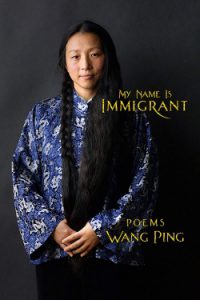 Whether they pull up their roots to flee war, the rising sea or drought, for religious freedom and freedom of speech, or simply to seek a better life, immigrants are the frontiers of civilization.
Whether they pull up their roots to flee war, the rising sea or drought, for religious freedom and freedom of speech, or simply to seek a better life, immigrants are the frontiers of civilization.
They are a force of nature, like salmon, monarchs, trees, water, and mountains, moving with rivers, the earth and universe.
Migration is the signature of life – no immigrants, no economy; no immigration, no civilization; no migration, no life.
We are all immigrants.
Wang Ping is Poet, professor, photographer, installation artist, author of 14 books and dancer.
My Name is Immigrant
by Wang Ping (Author)
Publisher: Hanging Loose Press (May 4, 2020)
Language: English
128 pages
ISBN-10: 1934909661
ISBN-13: 978-1934909669
2020
Paperback
$17.46
• fleursdumal.nl magazine
More in: #Editors Choice Archiv, - Book News, - Bookstores, Archive O-P, Archive O-P
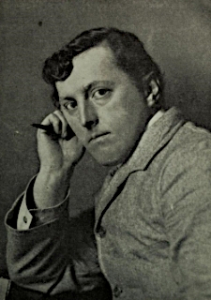
A Dream
My dead love came to me, and said,
‘God gives me one hour’s rest,
To spend with thee on earth again:
How shall we spend it best?’
‘Why, as of old,’ I said; and so
We quarrell’d, as of old:
But, when I turn’d to make my peace,
That one short hour was told.
Stephen Phillips
(1864 – 1915)
A Dream
• fleursdumal.nl magazine
More in: #Editors Choice Archiv, Archive O-P, Archive O-P
 From New York Times bestselling author, r.h. Sin, comes a care package of two new poetry and prose collections boxed together in an elegant slipcase.
From New York Times bestselling author, r.h. Sin, comes a care package of two new poetry and prose collections boxed together in an elegant slipcase.
R.H. Sin is a New York Times bestselling author of poetry books.
He lives in New York with his wife, poet Samantha King Holmes, and two kids.
I Hope She Finds This
by r.h. Sin (Author)
Publisher: Andrews McMeel Publishing
Dec 13 2022
Language: English
Paperback: 360 pages
ISBN-10: 1524871133
ISBN-13: 978-1524871130
$29.49
• fleursdumal.nl magazine
More in: #Editors Choice Archiv, - Book News, - Bookstores, Archive S-T, Archive S-T
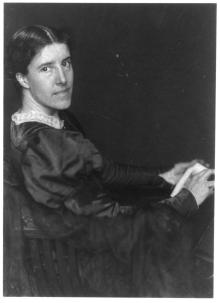
Women Do Not Want It
When the woman suffrage argument first stood upon its legs,
They answered it with cabbages, they answered it with eggs,
They answered it with ridicule, they answered it with scorn,
They thought it a monstrosity that should not have been born.
When the woman suffrage argument grew vigorous and wise,
And was not to be answered by these opposite replies,
They turned their opposition into reasoning severe
Upon the limitations of our God-appointed sphere.
We were told of disabilities–a long array of these,
Till one could think that womanhood was merely a disease;
And “the maternal sacrifice” was added to the plan
Of the various sacrifices we have always made–to man.
Religionists and scientists, in amity and bliss,
However else they disagreed, could all agree on this,
And the gist of all their discourse, when you got down in it,
Was–we could not have the ballot because we were not fit!
They would not hear the reason, they would not fairly yield,
They would not own their arguments were beaten in the field;
But time passed on, and someway, we need not ask them how,
Whatever ails those arguments–we do not hear them now!
You may talk of suffrage now with an educated man,
And he agrees with all you say, as sweetly as he can:
‘T would be better for us all, of course, if womanhood was free;
But “the women do not want it”–and so it must not be!
‘T is such a tender thoughtfulness! So exquisite a care!
Not to pile on our frail shoulders what we do not wish to bear!
But, oh, most generous brother! Let us look a little more–
Have we women always wanted what you gave to us before?
Did we ask for veils and harems in the Oriental races?
Did we beseech to be “unclean,” shut out of sacred places?
Did we beg for scolding bridles and ducking stools to come?
And clamour for the beating stick no thicker than your thumb?
Did we ask to be forbidden from all the trades that pay?
Did we claim the lower wages for a man’s full work today?
Have we petitioned for the laws wherein our shame is shown:
That not a woman’s child–nor her own body–is her own?
What women want has never been a strongly acting cause,
When woman has been wronged by man in churches, customs, laws;
Why should he find this preference so largely in his way,
When he himself admits the right of what we ask today?
Charlotte Perkins Gilman
(1860-1935)
Women Do Not Want It
Suffrage Songs and Verses
• fleursdumal.nl magazine
More in: #Editors Choice Archiv, Archive O-P, Archive O-P, Feminism, The Ideal Woman
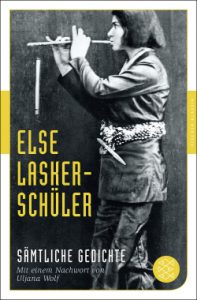
Ich weiß
Ich weiß, daß ich bald sterben muß
Es leuchten doch alle Bäme
Nach langersehtem Julikuß –
Fahl werden meine Träume –
Nie dichtete ich einen trüberen Schluß
In den Büchern meiner Reime.
Eine Blume brichst du mir zum Gruß –
Ich liebte sie schon im Keime.
Doch ich weiß, daß ich bald sterben muß.
Mein Odem schwebt über Gottes Fluß
Ich setze leise meinen Fuß
Auf den Pfad zum ewigen Heime.
Else Lasker-Schüler
(1869 – 1945)
Ich weiß
• fleursdumal.nl magazine
More in: #Editors Choice Archiv, Archive K-L, Archive K-L, Lasker-Schüler, Else
Confronted with a terminal cancer diagnosis, Jay Hopler–author of the National Book Award-finalist The Abridged History of Rainfall–got to work.
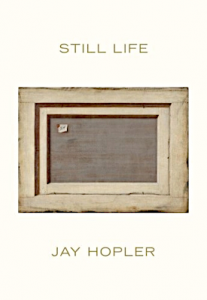 The result of that labor is Still Life, a collection of poems that are heartbreaking, terrifying, and deeply, darkly hilarious.
The result of that labor is Still Life, a collection of poems that are heartbreaking, terrifying, and deeply, darkly hilarious.
In an attempt to find meaning in a life ending right before his eyes, Hopler squares off against monsters real and imagined, personal and historical, and tries not to flinch.
This work is no elegy; it’s a testament to courage, love, compassion, and the fierceness of the human heart.
It’s a violently funny but playfully serious fulfillment of what Arseny Tarkovsky called the fundamental purpose of art: a way to prepare for death, be it far in the future or very near at hand.
Jay Hopler was born in San Juan, Puerto Rico, in 1970. He earned a BA in English and American Literature from New York University, an MA in Creative Writing from the Johns Hopkins University Writing Seminars, an MFA in Creative Writing from the Iowa Writers’ Workshop, and a PhD in American Studies from Purdue University. His first collection of poetry, Green Squall (2006), was chosen by Louise Glück as the winner of the Yale Younger Poets Prize; his second collection, The Abridged History of Rainfall (2016), was a finalist for the National Book Award in Poetry.
Hopler’s poems take as their starting point a formal virtuosity rooted in idiosyncrasy, passion of vision, and the beautiful (sometimes not-so-beautiful) violence of emotion. They are by turns plainspoken, erudite, opaque, clear, serious, and broodingly funny. Hopler is a dexterous poet, but never dogmatic. His poems make sense but not points; they think and reel and describe the broken world, without a wasted word. What the likes of G.M. Hopkins and Wallace Stevens and Robert Hayden carried out, Jay Hopler continues and expands upon, to gorgeous effect. According to poet Katie Ford, “Hopler’s vision and voice [are] both painfully complex because of how much of the world he allows to attach to him, to stake its claim on him.” Hopler is also an editor and translator.
His works include The Killing Spirit: An Anthology of Murder for Hire (1998), Before the Door of God: An Anthology of Devotional Poetry (edited with his spouse, poet and Renaissance scholar Kimberly Johnson, 2013), and The Museum of Small Dark Things: 25 Poems by Georg Trakl (2016).
The recipient of numerous honors and awards, including a Fellowship from the Lannan Foundation, a Whiting Award, the Great Lakes Colleges Association New Writers Award, two National “Best Books” Award from USA Book News, two Florida Book Awards, a Foreword Reviews Book-of-the-Year Award, and the Rome Prize in Literature, Hopler directs the program in creative writing at the University of South Florida.
Still Life
Jay Hopler (Author)
Publisher: McSweeney’s
Publish Date: June 07, 2022
Dimensions
6.36 X 8.5 X 0.46 inches
Language English
Hardcover
EAN/UPC 9781952119378
Price $18.00
• fleursdumal.nl magazine
More in: #Editors Choice Archiv, - Book News, - Bookstores, Archive G-H, Archive G-H
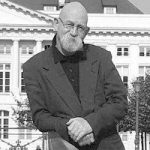
Nimmer schor is de maan
Zwier de korrels uit de aren, dorsers! Het bier en brood
van morgen moet jullie akkers uit. Op stille tenen verklaart
gelukkig de middag zich geduldig nader. Dat kreupelhout
onwillig is en de spar ontschorst. Dat regen op komst lijkt:
hoge wolken zijn gestreept als de borstveren van een havik.
De wijze weet dat de maan nimmer schor is en heeft een
naam die eigenlijk zachte dieren zouden moeten dragen.
Onderaan de dijk bloeit in pruilende klei de grote bevernel.
Bert Bevers
Nimmer schor is de maan
Verschenen in de catalogus Enghuizer dialogen, Hummelo, 2019
• fleursdumal.nl magazine
More in: #Editors Choice Archiv, Archive A-B, Archive A-B, Bevers, Bert
Wroeging
Hij verzamelde geld. Oud geld, nieuw geld, geld. Zijn huis was van geld, zijn tafel, zijn stoel, zijn tv, zijn vrouw, zijn zoon, zijn baby, zijn 06, zijn laptop, zijn auto, zijn tuin, zijn muren, zijn ramen, zijn huidige geld, zijn toekomstige geld, zijn wereld, alles van geld. In een droom zag hij zichzelf, zijn armen griezelig veranderd in briefjes van tien, zijn ogen zich harden tot munten van twee, zijn hart tot toren van munten verhard, zijn beide handen uit munten gesmeed. Zijn vrouw die op de achtergrond zijn portemonnaie kust. Hij begon te huilen als een kind dat wakker schrikt in het geloof dat zijn pasgedroomde nachtmerrie werkelijkheid is, tot hopelijk een lieve mama deze ontkent en hem geruststelt. Hij huilde steeds harder en harder en harder tot en met de volwassene die ineens voelt, weet dat zijn nachtmerrie zijn ware nachtmerrie blijkt.
Freda Kamphuis
Wroeging
Gedicht
• fleursdumal.nl magazine
More in: #Editors Choice Archiv, Archive K-L, Archive K-L, Kamphuis, Freda
Harvest Lingo is the fourteenth collection of poems by Lionel Fogarty, a Murri man with traditional connections to the Yugambeh people from south of Brisbane and the Kudjela people of north Queensland.
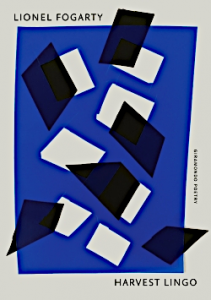 He is a leading Indigenous rights activist, and one of Australia’s foremost poets, and this collection displays all of the urgency, energy and linguistic audacity for which Fogarty is known.
He is a leading Indigenous rights activist, and one of Australia’s foremost poets, and this collection displays all of the urgency, energy and linguistic audacity for which Fogarty is known.
At the centre of the collection is a series of poems written in India. Deeply empathetic, these poems are remarkable for the connections they draw between the social problems the poet encounters in this country – poverty, class division, corruption – and those he sees in contemporary Australia, besetting his own people.
Other poems tell of encounters between people and between cultures, address historical and cultural issues and political events, and pay tribute to important Indigenous figures. There are intensely felt lyrics of personal experience, and poems which contemplate Fogarty’s own position as a poet and an activist, speaking with and for his community.
Fogarty’s poems are bold and fierce, at times challenging and confronting, moved by strong rhythms and a remarkable freedom with language. They are an expression of the ‘harvest lingo’ which gives the collection its title.
Lionel Fogarty was born on Wakka Wakka land, at Cherbourg Aboriginal Reserve in south-east Queensland in 1957. Throughout the 1970s he worked as an activist for Aboriginal Land Rights, and in the 1990s, after the death of his brother Daniel Yock, protesting against Aboriginal Deaths in Custody. His poetry collections date from the early 1980s; his most recent collections are Connection Requital; Mogwie-Idan: Stories of the Land; Eelahroo (Long Ago) Nyah (Looking) Mobo-Mobo (Future), all with Vagabond Press, and Lionel Fogarty: Selected Poems 1980-2017, published by re.press.
Harvest Lingo
by Lionel Fogarty
Poetry
Giramondo Publishing
112 pages
Paperback, 21 x 14.8 cm
Published June 2022
ISBN 9781925336177
$25,00
• fleursdumal.nl magazine
More in: #Editors Choice Archiv, - Book News, - Bookstores, Archive E-F, Archive E-F, Black Lives Matter, Racism
In her English-language debut, acclaimed French-language poet of the Palestinian diaspora Olivia Elias probes deeply into the upheavals of the twentieth and twenty-first centuries
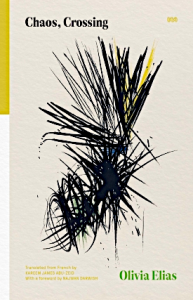 Poet of the Palestinian diaspora, born in Haifa in 1944, Olivia Elias writes in French. She lived until she was 16 years old in Lebanon where her family took refuge in 1948, then in Montréal-Canada, before moving to France.
Poet of the Palestinian diaspora, born in Haifa in 1944, Olivia Elias writes in French. She lived until she was 16 years old in Lebanon where her family took refuge in 1948, then in Montréal-Canada, before moving to France.
Her third and most recent collection, Chaos, Traversée, appeared in 2019. Characterized by terse, laconic language and strong rhythms, her poetry shows a deep sensitivity to the Palestinian cause, the plight of refugees and human suffering in general.
Her work, translated into English, Arabic, Spanish, Italian and Japanese, has been published in numerous journals and in anthologies.
Kareem James Abu-Zeid is a translator of writers from across the Arab world, including Najwan Darwish (Palestine), Adonis (Syria), Rabee Jaber (Lebanon), and Dunya Mikhail (Iraq). He has received an NEA translation grant, PEN Center USA’s Translation Award, a Fulbright Fellowship (Germany), and a CASA Fellowship (Egypt), among other honors. He is also the author of The Poetics of Adonis and Yves Bonnefoy: Poetry as Spiritual Practice.
Chaos, Crossing —translated by award-winning translator Kareem James Abu-Zeid—is a powerful chronicle of uprootedness, of times marked by inequality, injustice, and disconnection. These poems—presented here in a bilingual edition—seek the calm at the center of the storm, the still point amidst the chaos.
Chaos, Crossing
Olivia Elias (Author)
Kareem James Abu-Zeid (Translator)
Foreword by Najwan Darwish
Pub Date: 11/15/2022
Publisher: World Poetry Books
Product Number:9781954218079
ISBN978-1-954218-07-9
Binding: Paperback
Pages: 192
Price: $ 20.00
• fleursdumal.nl magazine
More in: #Editors Choice Archiv, - Book News, - Bookstores, Archive E-F, Archive E-F
« C’est à l’âge de quinze ans que le chant s’est éveillé en moi. Je m’ouvrais à la poésie et entrais, comme par effraction, dans la voie de la création… »
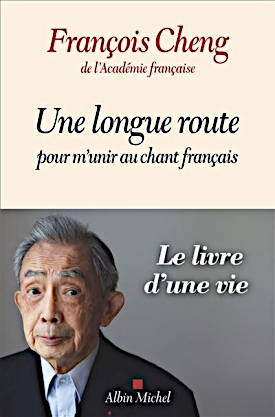 Depuis son premier essai sur l’eau et la soif – unique témoin de son adolescence chinoise qu’il a emporté en France et dont il nous livre aujourd’hui la traduction – en passant par ses rencontres avec Gide, Vercors, Lacan, Michaux, Emmanuel, Bonnefoy et tant d’autres, François Cheng nous fait partager la longue route qui l’a conduit à devenir, lui l’exilé qui ne savait dire ni « bonjour » ni « merci » lorsqu’il est arrivé à Paris, un poète français.
Depuis son premier essai sur l’eau et la soif – unique témoin de son adolescence chinoise qu’il a emporté en France et dont il nous livre aujourd’hui la traduction – en passant par ses rencontres avec Gide, Vercors, Lacan, Michaux, Emmanuel, Bonnefoy et tant d’autres, François Cheng nous fait partager la longue route qui l’a conduit à devenir, lui l’exilé qui ne savait dire ni « bonjour » ni « merci » lorsqu’il est arrivé à Paris, un poète français.
Cette route, malgré les affres de la guerre en Chine, l’extrême précarité matérielle des premières décennies en France, et de cruels tourments intérieurs, mais est toujours éclairée par la poésie française qu’il intériorise au fond de sa nuit solitaire. Elle l’est aussi par un amour passionné pour la langue d’un pays dont François Cheng a fini par épouser le « chant » et le destin. La lumière singulière qui émane de ce récit est celle d’une symbiose qui unit la Voie du Tao et la voie orphique et christique, orientant sans cesse le poète vers l’authentique universel.
François Cheng, de l’Académie française, est à la fois poète (Entre source et nuage, 1990 ; Le Livre du vide médian, 2004), romancier (Le Dit de Tianyi Prix Femina 1998, L’Éternité n’est pas de trop, 2002) et essayiste (Cinq méditations sur la beauté, 2006, L’un vers l’autre, 2008, Cinq méditations sur la mort autrement dit sur la vie, 2013, Assise, 2014). Il a publié De l’âme en 2016.
Une longue route pour m’unir au chant français
par François Cheng
Albin Michel
12 Octobre 2022
Littérature générale
Éditeur: Albin Michel (12 octobre 2022)
Langue: Français
252 pages
ISBN-10 : 2226477306
ISBN-13 : 978-2226477309
Broché €17,90
• fleursdumal.nl magazine
More in: #Editors Choice Archiv, Archive C-D, Archive C-D, Cheng, François
Why Misread a Cloud takes its name from clouds of ash and smoke in wartime which appear to the author as a “storm, blown over the sea.”
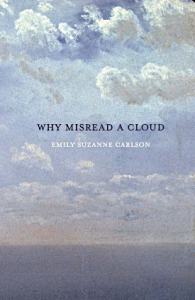 Both an exploration of the mind’s ability to turn what is into something else, in order to survive, and the mind’s ability to resist the effects of psychosocial warfare imposed by the military and the police.
Both an exploration of the mind’s ability to turn what is into something else, in order to survive, and the mind’s ability to resist the effects of psychosocial warfare imposed by the military and the police.
“Who wants you to be afraid” the poet’s friend asks as he “added sugar to his tea.” The realization this question brings enables the poet to explore forces that separate us from one another and ways we rise up within ourselves to move through fear toward love.
Emily Suzanne Carlson (she/they) is a mother, a poet, a teacher, and the director of Art in the Garden, a liberatory, anti-racist, LGBTQ+ welcoming, and joy-centered program that addresses the impacts of childhood adversity and trauma. Emily is the author of two prior collections: I Have a Teacher (Center for Book Arts 2016), and Symphony No. 2 (Argos Books, 2015). Emily earned a BA from Sarah Lawrence College and an MFA from the University of Pittsburgh. With friends, they run the Bonfire Reading Series. Emily lives with their partner and their three children in an intentional community centered around an urban garden in Pittsburgh, Pennsylvania.
Why Misread a Cloud
Emily Suzanne Carlson
Pub. Date: 10/31/2022
Publisher: Tupelo Press
ISBN: 978-1-946482-79-2
Binding: Paberback
Pages: 42
Price: $ 17.95
• fleursdumal.nl magazine
More in: #Editors Choice Archiv, - Book News, - Bookstores, Archive C-D, Archive C-D
Thank you for reading Fleurs du Mal - magazine for art & literature